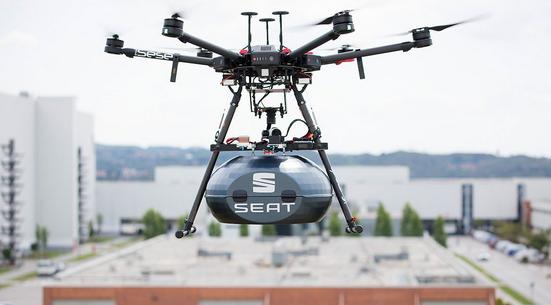
Seat and Grupo Sesé launch a parts delivery service using drones
The Seat factory in Martorell is the first Spanish plant to receive components via drone delivery. In collaboration with Grupo Sesé, the Spanish carmaker has a pioneering service connecting Sesé’s logistics centre in Abrera with the Seat factory using drones.
The first parts delivery service between two production plants in Spain by drone will deliver steering wheels and airbags to the Seat assembly lines.
The pilot project is being carried out under the supervision of the Spanish Aviation Safety and Security Agency (AESA) and will go forward in an experimental phase with several flights per day.
The addition of drones will improve flexibility on the production lines by connecting the just over two kilometre distance that separates both facilities for just in time fast deliveries in only 15 minutes, a process which is currently done by truck and takes 90 minutes.
With this move, every time a part is needed on the production line, delivery will be made quickly, thus improving efficiency.
This innovation is framed within Seat’s commitment to Industry 4.0. The company is now undergoing an ambitious transformation process aimed at making the Martorell factory smarter and further digitalised and connected in order to boost efficiency, flexibility and sustainability.
Delivery using drones represents a reduction in CO2 emissions compared to truck transport and in addition, the drone’s batteries are recharged using renewable energy.
Seat Vice-president for Production and Logistics Dr. Christian Vollmer, said that “today’s flight is the first step in transforming the supply chain in the automotive industry.
“Delivery using drones is going to revolutionise logistics, as for example in the case of Seat it will reduce delivery time by 80%. With this innovation we are boosting Industry 4.0 and we will become more efficient, agile and competitive, as well as much more sustainable.”
Seat is undergoing a transformation process to become a smart factory and is adapting all its production activities to the digital environment with the most disruptive technologies on the market.
As an example of this transformation, Seat plans its supply chain with simulation tools and uses smart picking and autonomous navigation systems.
Furthermore, the company has introduced big data tools and artificial intelligence to monitor and control the main facilities and infrastructure of the supply chain in real time.
Seat’s innovation in its logistics processes was recently acknowledged by the International Logistics Exhibition (SIL) held in Barcelona at the end of June with an award in the supply chain digitisalisation category, which King Felipe VI presented to Dr. Vollmer.
